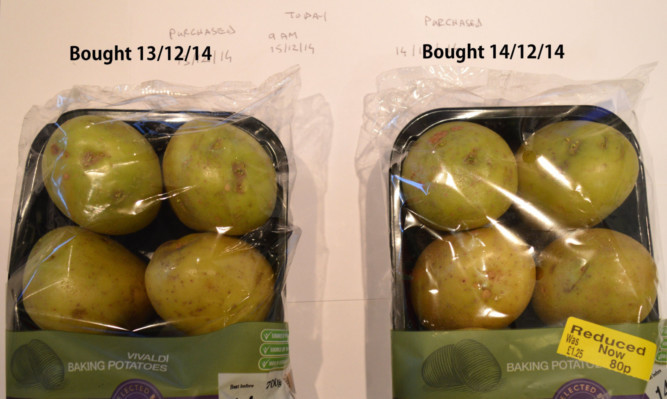The crisis in the dairy sector has been attracting the headlines of late, but the one facing potato producers is no less serious.
Prices of seed and processing potatoes have held up, but ‘free buy’ potatoes destined for pre-packing have slumped to new lows.
The pain is similar, and supermarket price cutting is implicated in both, but the problems facing the two sectors are very different in origin.
Milk prices have dropped like a stone in the face of a toxic mix of weak global demand and increased supply.
Potato prices are different in a couple of ways. Firstly, the market is not globalised to the same extent, with British potatoes eaten by and large by British people. Secondly, this year’s problem is only partly due to what have undoubtedly been good crops.
The big problem with fresh potatoes is that per-capita consumption has dropped by an estimated 15% in the last couple of years
To combat this tumbling consumption, NFU Scotland has urged the potato industry’s statutory levy body, the Potato Council, to consider shifting its funding emphasis from research and development to more promotion.
The timing is appropriate because there is a consultation under way on the Potato Council’s draft business plan, which includes what many see as an unfortunately timed proposal to raise the statutory levy on growers and packers.
Commenting on the NFUS submission to the consultation, Fife potato producer Russell Brown, chairman of the Potatoes Working Group, said: “Scottish growers value our close contacts with the Potato Council (PCL) via the council’s permanent presence in Scotland and regular attendance at NFUS meetings. In particular, the support of the seed potato sector is hugely important to Scotland.
“However, the number one issue faced by the sector right now is the continuing fall in consumption of fresh potatoes, and the impact that has on farm-gate prices.
“Diminishing demand for potatoes has, unfortunately, seen retailers pay less and less attention to the marketing of the product.
“Sales, as a result, are currently caught in a downward spiral that we must turn around.
“We recognise that solutions are not simple but many Scottish growers have identified the need, at this time, for a shift of emphasis in the levy budget priorities from research and development to promotion.
“The existing ‘One Voice’ Campaign could form the basis of an enhanced promotion effort.
“Messages about the health benefits of potatoes in comparison to other carbohydrate sources need to be put in front of consumers in a medium that they regularly access, such as consumer magazines.
“That could also provide the platform to overcome the public’s perception that potatoes are time-consuming to cook,” he said.
“The role of health professionals in recognising the benefits of potatoes in the diet would be helped by having potatoes accepted as a vegetable for ‘five-a-day’.
“Achieving that might have to come after the message on the benefits of potatoes in the diet starts to get through to health and nutrition experts.”
Mr Brown also pointed to the need to work with retailers to improve the presentation of potatoes in stores. “Growers continue to be appalled at the number of green potatoes still appearing in packs and shelves.
“A move away from plastic packaging would help to reduce the green potato problem. We understand that where retailers use more suitable paper packaging, it helps increase the perception of potatoes as a valuable product.
“We appreciate this is a very difficult year for potatoes, but we have chosen to support the proposals for a levy increase.
“If the spend of levy funds can be seen to be making a more positive impact on consumption, and therefore the value of fresh potatoes, this would help growers to see the value in their levy contributions.
“One area of levy spend that growers also believe merits additional resources is market forecasting. Given the current difficulties, better balancing of likely demand with plantings could help to reduce the risk of over-supply.”
A Potato Council statement welcomed NFUS support for a “small levy increase in challenging times”.
The decision to recommend an increase lies with Potato Council’s parent body, the Agricultural and Horticultural Development Board, which meets on January 27.
The Potato Council board will meet on February 11.
The statement said: “Their commitment is to consider each and every line of consultation and leave no stone unturned in achieving a balanced final plan.
“We have a lot of successes under our belt with regard to health, and have achieved positive potato profile within Change for Life and NHS Choices, and we’ve maintained the potato’s naturally fat-free status which was up for review last year.
“We’ve also cleared all the national hurdles and submitted a bid to the EU which, if successful, will grow our fresh-sector marketing effort by £1.5 million.”
“The February meeting will also consider a new research and innovation strategy.
“Production efficiency is likely to remain key, particularly for our processing levy payers, and needs to be accounted for.
“That said, the strategy has a new ‘consumer-led’ feel. Again the direction of travel is already good, with work under way on greening, starch and bio-fortification for nutrition.”
